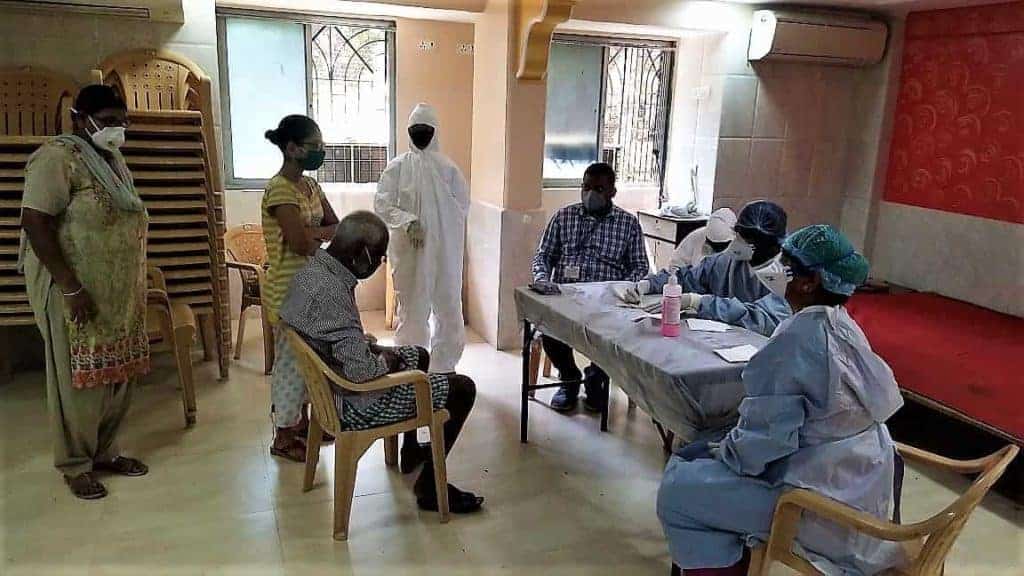As fears towards an impending third wave – set to reveal itself in October according to the World Health Organisation (WHO) – have set in the city, there is a deeper concern among parents of young children who are yet to be vaccinated. To ensure the safety of their wards, many parents have restricted their children from playing in common premises where they would normally interact with other children.
On September 13, only ten children were admitted in Mumbai hospitals (nine in the NESCO COVID-19 care facility and one in Seven Hills Hospital) with moderate or severe symptoms of the virus, additional municipal commissioner of the Brihanmumbai Municipal Corporation Suresh Kakani informs me. This is apart from the 200-odd children who are detected COVID-19 positive but are asymptomatic and hence under care at their own homes.
While the numbers among children are seeing a marginal rise, the BMC says that it is not of much concern. This is because the recovery rate among children is very high and the turnaround time – i.e. the time from admission till discharge in hospital- is satisfactory. Most of the children admitted were discharged within five to seven days and with no fatalities reported yet. Additionally, the cases of COVID-19 among children is less than 10- 12 percent of the total number of positive cases since the inception of the pandemic, and so, there is no cause for alarm or panic, says Maharashtra’s state surveillance officer for monitoring epidemic diseases, Dr Pradip Awate.
The state’s nine-member task force has recommended setting up of fever clinics with paediatricians or trained staff to screen children with COVID-19 symptoms. Dr Suhas Prabhu, who heads the task force, stated that said children show symptoms like diarrhoea, loss of appetite and fever as common signs of Covid-19, unlike adults who suffer weakness, body pain, fever, loss of smell and taste, the Indian Express reports.
Read more: Mumbai housing societies gear up to tackle third wave of the pandemic
How will the BMC track and trace COVID-19 positive children?
3500 local ASHA workers have been told to stay alert towards the health of the children under their care. Besides this, the BMC has already asked general practitioners and paediatricians to inform the BMC if they come across children showing symptoms.
Cases among children are also likely to be tracked from contact tracing in case an adult around them tests positive. The BMC already checked all the orphanages and rehabilitation centres initial after many children tested positive in a few centres.
What are the facilities set up by the BMC?
The BMC has already set aside 1500 paediatric beds all supported with oxygen facilities including 222 in paediatric ICU beds and 329 for neonatal ICU beds. This is besides stocking up on healthcare facilities like oxygen masks, medicines, paediatric incubators and ventilators. The BMC has also planned to accommodate adult facilities for children, in case such a need arises. The paediatric facilities include a stay facility for positive children along with a covid-negative parent and also to stay with a covid-positive parent.
Maharashtra has reserved 15 percent of all beds in COVID-19 Care centres meant for mild symptomatic patients, about 10 percent of beds in the COVID-19 health centres meant for moderate cases and 10 percent of beds in the COVID-19 Care hospitals meant for severe cases. Existing facilities like the helplines, ward-wise control rooms, the ambulance services etc, would be utilised to avoid excessive cases, as per the guidelines discussed and decided by the Paediatric Covid Task Force set up by the government of Maharashtra.
What is the SOP that the BMC is following?
If a child tests positive, their local ward control room will intimate the family and check if the child has comorbidities or allergies. If the child is asymptomatic, then the BMC team will execute regular check-ups either on the phone or by a visit from a medical team. If the family doctor or the visiting BMC team recommends hospitalisation for the child, then the family will be asked to choose the facility for admission, which is possible in the current climate with relatively few cases. If numbers rise again, families will have to admit their child at any hospital of the BMC’s choosing. Once admitted, appointed doctors would take charge of the course of treatment. These guidelines are as per the SOP on treatment for COVID-19 in children issued by Union Ministry of Health and Family Welfare on June 18, 2021. Mild and asymptomatic children could be treated at home and need not be hospitalised unless they show moderate or severe symptoms.

How bad is COVID-19 among children?
Scientifically, children are naturally protected against the virus as they lack receptor cells (that allow the virus to infect a body), says Dr Awate. Healthier children may not be at risk but only those who have comorbidities like obesity, diabetes or heart issues, need to take additional care, he says.
What are the dos and don’ts for parents?
Parents need to take their child to the doctor and test their children at the earliest so that the child can recover fast, says Kakani. He urged parents to test their children either from the 266 free check-up centres for RTPCR and antigen tests or from private testing at their homes in case they show symptoms. Dr Awate also recommends that parents complete their children’s basic immunization like BCG, Diphtheria etc. that was disrupted last year due to the lockdown.
BMC’s word of caution
Though, as of now, the cases among children are not alarming, the BMC says that they would prefer to be cautious till October 5, when they expect workers and other residents to return back to Mumbai post-Ganpati celebrations and the monsoon gap. Parents are urged to test their children at the earliest in case they display any COVID-19-like symptoms.
This explainer is part of a series on ‘Explainers and Information Resources for Mumbaikars’ supported by a grant from the A.T.E. Chandra Foundation.